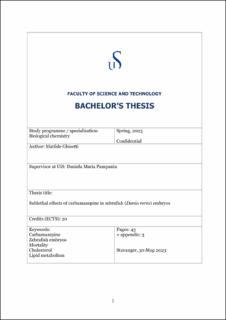| dc.description.abstract | Pharmaceuticals are produced and used in very large volumes and their use and diversity is increasing every year. The presence of pharmaceuticals in aquatic systems is recognized as a widespread problem and monitoring these contaminants in the environment is important since their presence can affect the ecosystems even at very low levels. Wastewater treatment plants have been identified as a major route for release of pharmaceuticals in aquatic environment. The antiepileptic drug carbamazepine (CBZ) has been detected in municipal sewage and surface water samples and it potentially poses an environmental risk.
In this thesis, the effect of environmentally relevant CBZ concentrations on lipids metabolism in zebrafish (Danio rerio) embryo was evaluated. CBZ exposure solutions had a final concentration of 1, 5, 10 and 50 µg/L, aquarium medium and a 0.001% DMSO solution were used as controls. Embryos were exposed for 72 h and 96 h.
Mortality at the end of each exposure time was assessed. Fluorometric assays were used to measure lipids concentration. Triglyceride, free fatty acid and total and free cholesterol were chosen to represent changes in lipid metabolism in embryos exposed to CBZ.
There was no significant difference in embryo mortality at 72 h and 96 h exposure, except for exposure group with 5 µg/L CBZ. This group showed a significant higher mortality at 72 h exposure. Overall, lipid results showed that the exposure to CBZ affected the lipid metabolism both after 72 h and 96 h of exposure. At 72 h of exposure, there were significant differences in free cholesterol and free fatty acid concentrations as well. At 96 h of exposure, there were significant differences in triglyceride concentration.
Lipids perform many important functions in the organism and changes in lipid metabolism in zebrafish embryos could cause adverse effects on their growth, behaviour and reproduction These alterations can affect fish health and impact the aquatic ecosystem. The results obtained in this thesis showed that CBZ can be a possible threat for the aquatic environment. They also confirmed the necessity of further studying the effects of pharmaceuticals on the aquatic ecosystem, to better assess their ecotoxicity.
This thesis is related to the PHARMASEA project. This project studies the occurrence, distribution, fate and biological effects of pharmaceuticals in the marine environment. | |
